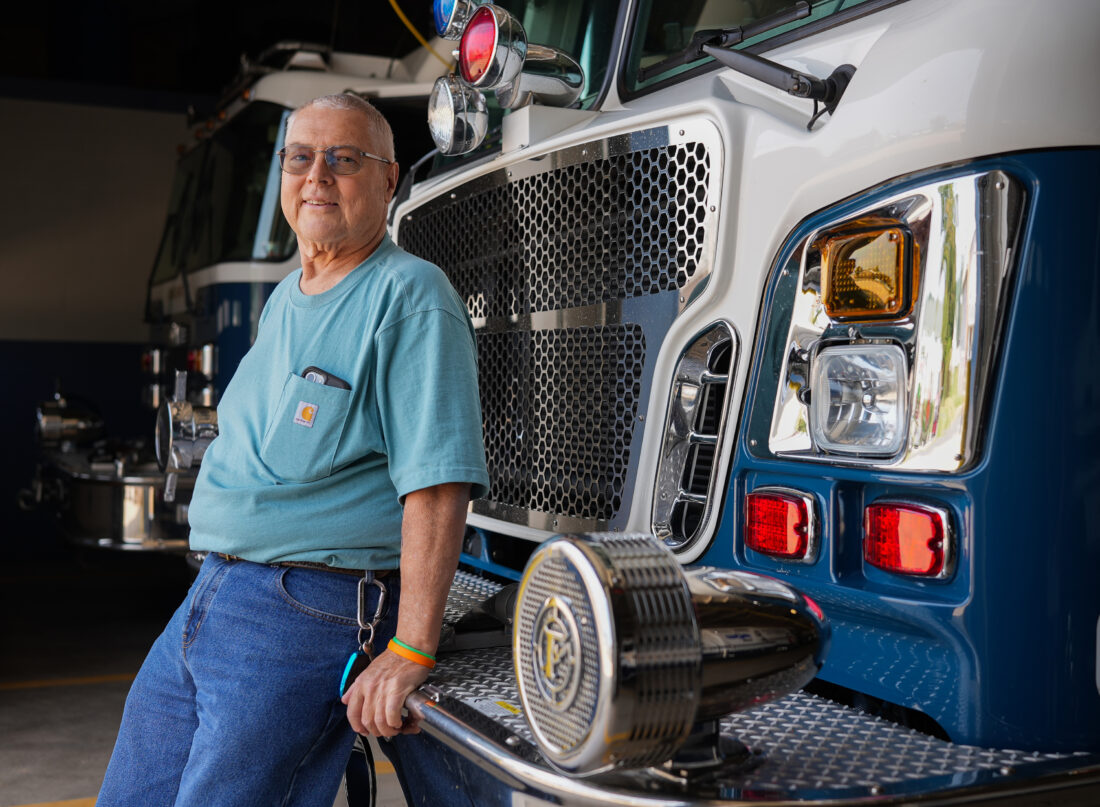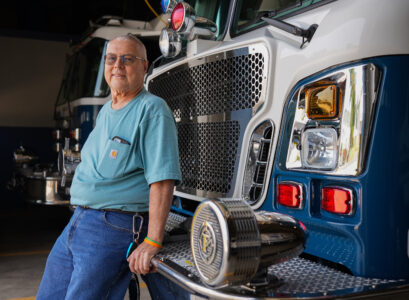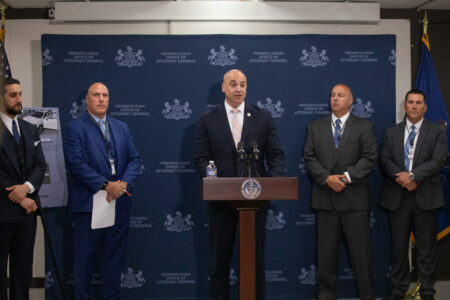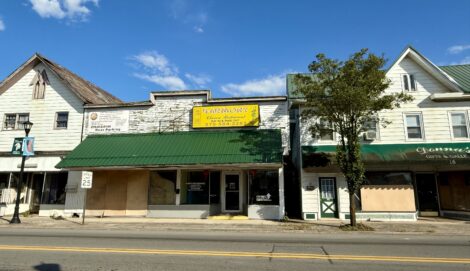President of volunteer fire department searching for kidney donor

David Braun sits on the front of one of the trucks at the Hughesville Volunteer Fire Department as he talks about his need for a kidney donor. Braun has been on a list to get one for the past 2 and a half years and he and his wife spend 5 days a week doing his dialysis and home. He’s been a member of the Hughesville Volunteer Fire Department for over 30 years. DAVE KENNEDY/Sun-Gazette
David Braun, a first-responder, has spent 51 years serving our community. Today at age 65, Braun is in need of help from that same community in the form of a kidney donation.
Now serving as president of the Hughesville Volunteer Fire Department, Braun is in kidney failure, requiring dialysis for six hours a day, five days a week and is on the kidney transplant list at John Hopkins.
He was diagnosed with kidney disease in 2019, eventually coming under the care of Maria Camila Bermudez, MD, at Geisinger.
“She is an absolutely wonderful doctor. We were watching diet and trying to do everything we could.” said Braun
Unfortunately in 2022 the kidney disease progressed to a point where he had to be hospitalized.
Braun went to a local emergency room and was life-flighted to Geisinger Danville, spending a week in the ICU.
“That’s when I started dialysis and all that kind of stuff and going through the steps for a kidney transplant,” said Braun.
Those steps involved a triple-bypass on his heart and back surgery to fuse his lower lumbars in 2024.
Throughout all his medical challenges, Braun has remained a faithful volunteer in the fire department and beyond.
“I still respond to calls. I’m not much use on them anymore, but I still help where I can work, the carnival and stuff like that, run the meetings, those types of things,” said Braun.
“So I’m still here often, but not as often as I used to be. I used to run calls in the morning when I was home, now I don’t because I’m stuck,” said Braun of his time needed for the dialysis.
In addition to being the department president, Braun also teaches, being a state instructor for other firefighters in vehicle rescue, Hazmat, pumps and rural water supply to name a few.
“I can teach at nights and weekends and stuff, but I have to be careful. If I teach Saturday, Sunday, we have to come home Sunday and run dialysis, we’re there until 11, 12 o’clock at night,” he said.
“It’s a lot of fun,” said Braun of teaching,” you get to meet a lot of good people,” said Braun.
One of those good people he met while teaching a UTV class in Danville was a woman with connections to the organization Kidneys for Communities, which is helping Braun in his search for a donor.
The non-profit seeks to match donors with a particular community group or organization, such as unions, fraternities, religious groups, teachers or in Braun’s case, first responders.
“It’s great, there’s a whole bunch of different groups and communities out there,” said Braun about Kidneys for Community.
Like other organizations in the kidney space, Kidneys for Communities is dedicated to saving lives by increasing living kidney donation. Where they are different is in how they go about it., said Atul Agnihotri, board chair and CEO of Kidneys for Communities.
“Most efforts focus on individual outreach–asking one person at a time to step forward. Given that 96% of living kidney donors in the U.S. donate to someone they are related to, know personally, or feel a strong affinity with, Kidneys for Communities has taken a unique community-based approach. We partner with first responders–firefighters, police, EMTs–as well as farmers, ranchers, and children’s groups across the country. These organizations already share deep bonds of trust, service, and solidarity. By educating and supporting members within those communities, we create a much larger and more sustainable pool of altruistic donors,” added Agnihotri.
The organization also provides support for donors from someone who has donated a kidney and a financial package to cover out-of-pocket expenses and lost wages, said Agnihotri.
“If it can reach out and somebody’s willing to donate a kidney, that only helps me get moved up on the list and hopefully gets this resolved faster,” shared Braun.
He is able to do his dialysis at home, with help from his wife of 42 years, Tammy.
Braun met his wife on an ambulance call for her grandfather in 1978.
“She is my nurse,’ said Braun.
“My wife runs my machine, takes perfectly good care of me,” shared Braun of the at-home dialysis machine through DaVita Kidney Care.
“She’s been wonderful,” he added of his wife.
Tammy also helps with the restrictive diet that someone in renal failure has to adhere to.
“You have to follow that diet pretty religiously, really my wife is just wonderful following it, she measures, she weighs, she is just absolutely wonderful,” said Braun.
Receiving a kidney transplant would allow not only David to be free to being tied to the dialysis machine but his wife as well.
“You’re basically tied to home, which ties my wife home as well, because she has got to be there in case something goes wrong. She’d be out a lot more out and running, taking the grandkids to the playground,” said Braun of the pair’s two grandchildren, ages two and six-months.
Adding that his wife left her job in 2022 to take care of him.
A kidney recipient himself, Agnihotri understands firsthand the challenges Braun is facing daily. “One of the most rewarding parts of this work is getting to know people in need of a kidney and helping to share their stories. In many ways, I see my own story reflected in each of them. When I was diagnosed with a kidney disease, I had a wife and young kids that I worried about constantly, and my job needed extensive travel and it was difficult to manage.The reality is heartbreaking: at any given time, nearly 100,000 people in the U.S. are waiting for a kidney. The average wait is four to six years, and during that time, many patients on dialysis will either pass away or become too sick to be transplanted. Dialysis can sustain life, but it also ties an entire family to a machine. Every outing, every trip, every plan becomes complicated, filled with constant worry and limitations.”
Receiving a kidney would also allow Braun to spend more time at the firehall, something he has done since he was a child.
“I’ve always been in the fire company. My dad was a captain at Mars, and I grew up in the firehall,” adding he joined as a member of Mars Fire Department as a junior firefighter in 1974.
Braun is grateful to be involved with Kidneys for Communities, which features a webpage telling his story and need for a kidney donation.
“You get publicity, you get noticed and somebody reads your story and then who knows where it goes from there. Just like I made an offhand comment about dialysis in a class and look where it’s led. I mean something like that can happen and it’s a wonderful thing and if people are willing to donate organs, that’ll help. There are tons of people on the kidney list,” said Braun.
“It helps the person out a lot, gets rid of dialysis, gives you your life back,” he added.




